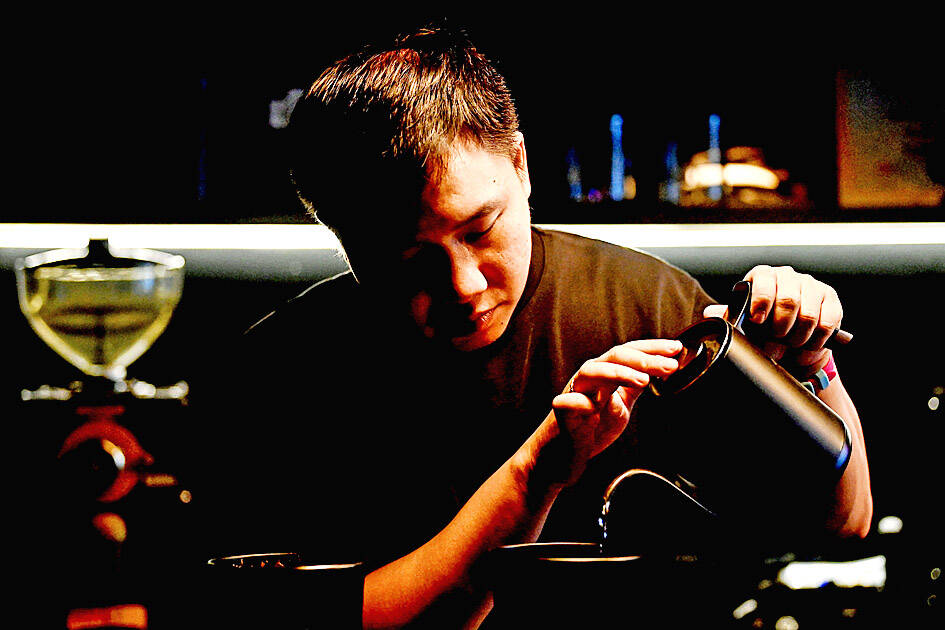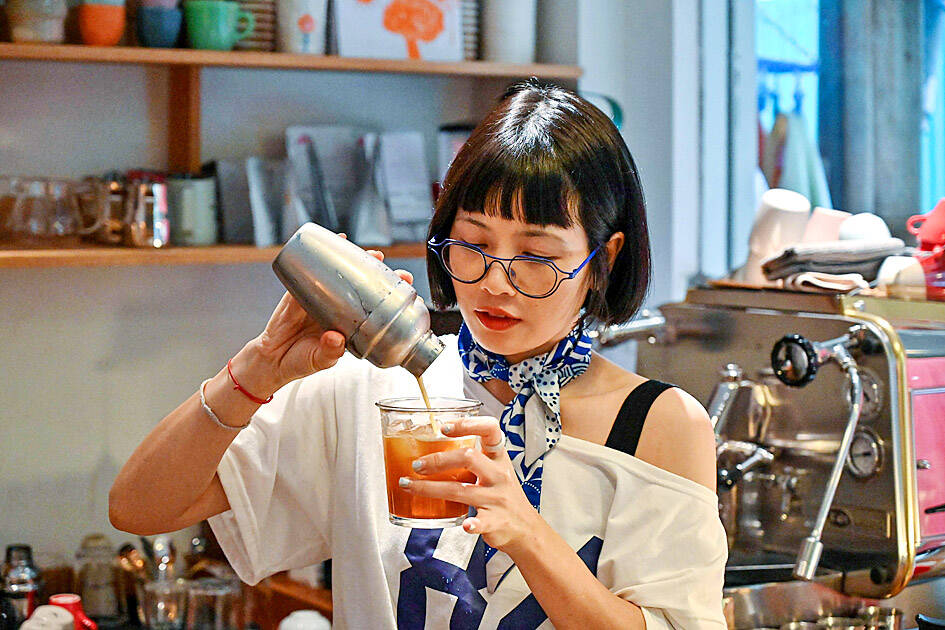Ditching a lucrative career in finance, Vu Dinh Tu opened a coffee shop without telling his parents, joining a wave of young Vietnamese entrepreneurs using espressos to challenge family expectations around work.
Traditionally taken black, sometimes with condensed milk, or even egg, coffee has long been an integral part of Vietnamese culture.
However, starting a cafe is not a career that many of Vietnam’s growing group of ambitious middle-class parents would choose for their children.

Photo: AFP
“At first my family didn’t know much about it,” 32-year-old Tu said. “Gradually they found out — and they weren’t very supportive.”
Tu’s parents repeatedly tried to convince him to stay in his well-paid investment banking job, but he persevered and opened four branches of Refined over four years in Hanoi.
Each is packed from morning till night with coffee lovers enjoying Vietnamese robusta beans — in surroundings more like a cocktail bar than a cafe.

Photo: AFP
His parents “saw the hard work involved in running a business — handling everything from finances to staffing, and they didn’t want me to struggle,” Tu said.
Vietnam was desperately poor until the early 2000s, pulling itself up with a boom in manufacturing, but many parents want to see their children climb the social ladder by moving into steady, lucrative professions such as medicine and law. Coffee, on the other hand, has become a byword for creativity and self-expression.
In Vietnam, “cafes have become a way to break norms around family pressure to do well in school, go to college, get a degree ... work in something that is familiar and financially stable,” said Sarah Grant, an associate professor at California State University.
“They have also become spaces of possibility where you can bring together creative people in a community, whether that’s graphic designers ... musicians, other kinds of do-it-yourself type people,” said Grant, an anthropologist specializing in Vietnam.
Coffee first arrived in Vietnam in the 1850s during French colonial rule, but a shift in the 1990s and early 2000s to large-scale production of robusta — usually found in instant brews — made the country a coffee production powerhouse and the world’s second-largest exporter.
A passion for the coffee business is often linked to that history, Grant said.
Coffee entrepreneurs are “really proud that Vietnam is this coffee-producing country and has a lot of power in the global market,” she added.
Down a tiny alley in the heart of the capital, 29-year-old Nguyen Thi Hue was mixing a lychee matcha cold brew in her new glass-fronted shop — a one-woman “Slow Bar” coffee business.
“When making coffee, it’s almost like being an artist,” said Hue, who had her first cup as a young child thanks to a neighbor who roasted his own.
Coffee is also hugely trendy, and there is money to be made if a cafe appeals to selfie-loving Generation Z.
“No one dresses poorly to go to a cafe,” said Hue, herself decked out in stylish bright-blue-rimmed glasses and matching necktie.
Relaxing at a rival shop nearby, Dang Le Nhu Quynh, a 21-year-old university student, is typical of the new generation of customer — she says the cafe’s style is what counts for her more than the brews.
“I don’t like coffee that much,” she said.
Vietnam’s US$400 million coffee shop industry is growing up to 8 percent a year, branding consultancy Mibrand said.
Thousands of shops are not officially registered with authorities, said Vu Thi Kim Oanh, a lecturer at Royal Melbourne Institute of Technology Vietnam.
“If we have problems with a job at the office, then we quit and we think: ‘Let’s get some money together ... choose one place, rent a house and then open a coffee shop,’” she said. “If it goes well, then you continue. If it doesn’t, you change.”

FEROCIOUS FISH-EATER Scientists have found a new species of dinosaur from the Cretaceous Period, a ‘hell heron’ that stalked the rivers, deep in the Saharan desert At a remote Sahara desert site in Niger, scientists have unearthed fossils of a new species of Spinosaurus, among the biggest of the meat-eating dinosaurs, notable for its large blade-shaped head crest and jaws bearing interlocking teeth for snaring fish. It prowled a forested inland environment and strode into rivers to catch sizable fish like a modern-day wading bird — a “hell heron,” as one of the researchers put it, considering it was about 12 meters long and weighed 5-7 tons. The dinosaur presented a striking profile on the Cretaceous Period landscape of Africa some 95 million years ago as it hunted

THE TRAGEDY OF PUNCH: Footage of the seven-month-old Japanese macaque has gone viral online after he was rejected by his mother and formed a bond with a soft toy A baby monkey in Japan has captured hearts around the world after videos of him being bullied by other monkeys and rejected by his mother went viral last week. Punch, a Japanese macaque, was born in July last year at Ichikawa City Zoo. He has drawn international attention after zookeepers gave him a stuffed orangutan toy after he was abandoned by his mother. Without maternal guidance to help him integrate, Punch has turned to the toy for comfort. He has been filmed multiple times being dragged and chased by older Japanese macaques inside the enclosure. Early clips showed him wandering alone with

DRUG WAR: The former president said there was no campaign to kill addicts, but his speeches called for violence and told police to use lethal force if necessary Former Philippine president Rodrigo Duterte earned global infamy for the deadly drug crackdown that led to his arrest over crimes against humanity charges, despite his huge popularity at home. A profane-lipped populist and self-professed killer, Duterte’s anti-crime campaign resulted in the deaths of thousands of alleged dealers and addicts. Rights groups said many of those killed were poor men, often without any proof they were linked to drugs. Yet, while drawing condemnation abroad, tens of millions of Filipinos backed his swift brand of justice — even as he joked about rape in his rambling speeches, locked up his critics and failed to

Australian Prime Minister Anthony Albanese yesterday said he did not take his security for granted, after he was evacuated from his residence for several hours following a bomb threat sent to a Chinese dance group. Albanese was evacuated from his Canberra residence late on Tuesday following the threat, and returned a few hours later after nothing suspicious was found. The bomb scare was among several e-mails threatening Albanese sent to a representative of Shen Yun, a classical Chinese dance troupe banned in China that is due to perform in Australia this month, a spokesperson for the group said in a statement. The e-mail